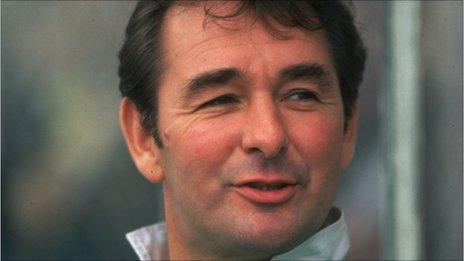Brian Clough: Like him or loathe him, Old Big 'Ead will not be forgotten
- Published
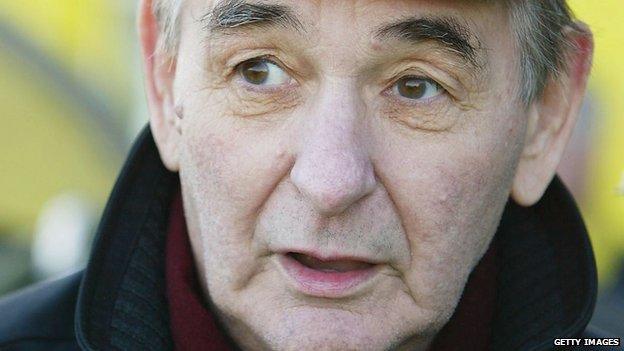
Many places have laid claim to the legacy of Brian Clough.
Both as a player and a manager, he left his mark on towns and cities across England, where you can find statues, memorial trophies and even a dual carriageway named after him.
But the larger-than-life character - who died 10 years ago today - also touched the lives of many people in more personal ways.
Here are a selection of memories of Old Big 'Ead - from a career that spanned five decades.

Middlesbrough (1955-61)
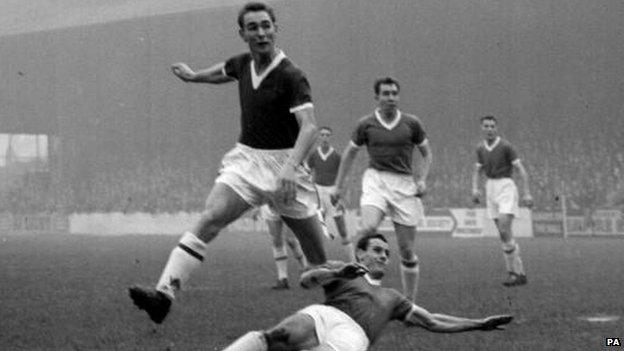
Clough began his senior professional career at 'Boro in 1955
He scored 197 goals in 213 appearances
His record makes him one of the club's highest-ever goal scorers
Former striker Alan Peacock played alongside Brian Clough at Middlesbrough in 1958.
"He was a phenomenal goal scorer and is still one of the top in the history of the club," said Peacock.
"When we first met, he was in the RAF and I was working in the steelworks. We only ever used to meet at games on Saturdays for the first four years.
"He always had something to say about someone and that caused a lot of arguments.
"He said what he thought and you either had to take it or stuff it but he was usually always right.
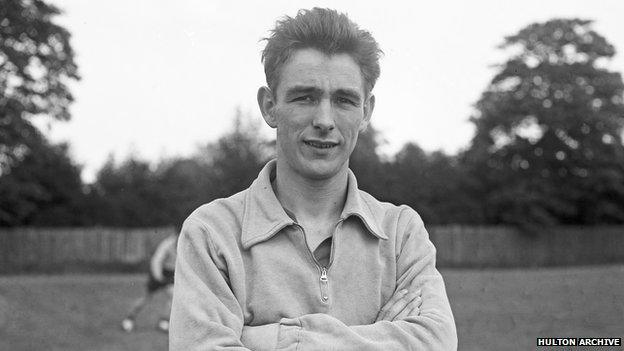
Clough made a huge impact at Middlesbrough and later won two England caps
"When I was in Plymouth, he was manager at Derby. I got an injury and the club decided it would be no good for me to carry on playing.
"One of our last matches was against Derby and Brian came up to me and said 'come and play for us'.
"I said 'I'm finished, I can hardly turn'.
"He said 'I don't want you to play up front, I want you to play at the back'.
"Of course I hadn't played that position for a long time.
"After I retired I realised I possibly had another couple of years in me.
"I often look back now and think he was right."

Sunderland (1961-64)
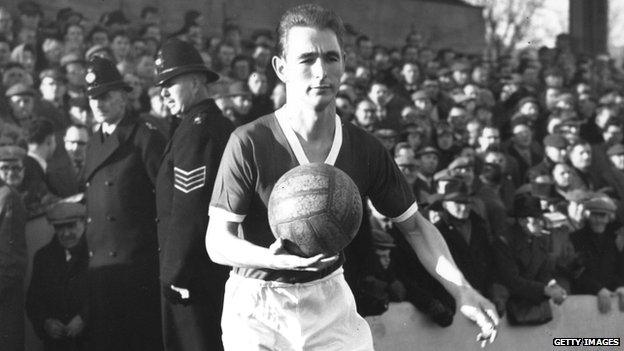
Clough scored 54 goals in 61 appearances for Sunderland
A serious knee injury put him out of action for two years
He managed three more games before retiring at 29
Stan Anderson, who has written about playing with Brian Clough in his book Captain of the North, first met the brash young striker at Sunderland.
"A lot classed him as arrogant," said Anderson, who was the club's captain.
"But as you got to know him he was quite sensitive."
"One of his first matches for Sunderland was against Walsall, we got beat 4-3.
"He came into the dressing room and said 'if we'd had any sort of defence, we'd have won that match', which was true enough.
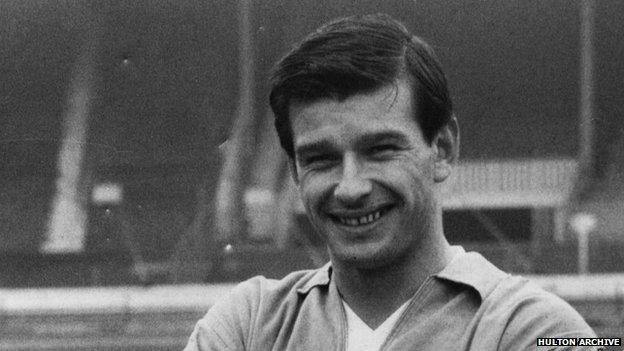
Stan Anderson said he became friends with Brian Clough after they stopped playing together
"But I said 'Brian, that's not the thing to say, we play as a team' - he took it fair enough.
"His main interest was scoring goals and that was it.
"There was no point telling him he'd missed a chance, he'd focus on the ones he scored."
Anderson said they became friends after they stopped playing together and described how he was going through a difficult time when Clough called to console him.
Clough invited his former captain to be his guest at a Derby County match.
"I'd had enough of football but he said 'I won't take no for an answer' and put the phone down, that was Brian.
"I had a nice day with him."

Hartlepool (1965-67)
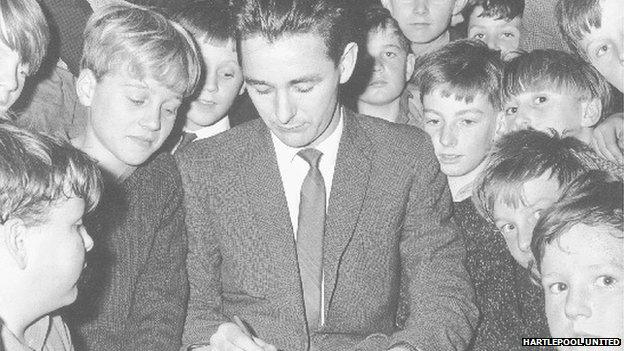
Clough became Hartlepools United's manager at just 30
It made him the youngest manager in the league at the time
Clough and his assistant Peter Taylor led the team to an 8th place finish
A young John McGovern first met Clough at Hartlepools United (now Hartlepool United) and went on to serve him at Derby, Leeds and Forest.
"It was exceptionally easy working for him if you were 100% committed to being a decent footballer," said McGovern.
"He was one of the best mangers the game has ever seen. The most flamboyant and outspoken and he was an inspiration.
"When I joined Hartlepool, every time I got the ball I used to try to run with it past other players. I wasn't very successful.
"One day at training, Brian told me to dribble a ball around a corner flag and back as fast as I could.
"He then told me to do it again without the ball.
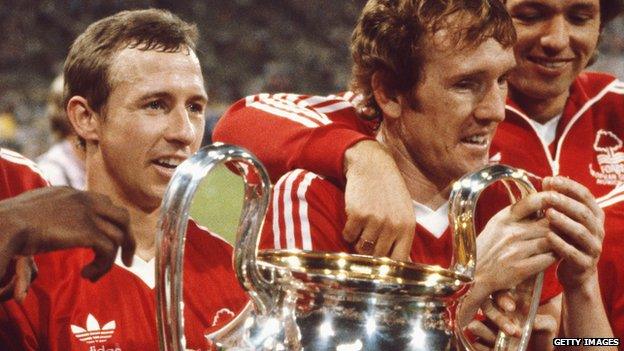
John McGovern (left) lifted the European Cup twice for Nottingham Forest under Brian Clough
"Then he asked 'which was easier?'
"I told him without the ball was easier and he replied 'well why don't you try passing it on Saturdays then?'.
"I learnt that from him at 16 and I remembered it until my 30s. I'll never forget it because I took everything he said to be the way you play.
"He knew I was enthusiastic and wanted to play football, I wanted to improve and win, and he knew I was committed.
"Sometimes he would tell me to get off the training field and not to do any more.
"I just wanted to perfect my game but he would tell me to rest. 'Save yourself for Saturday' he would say.
"He had that knack of saying the right things, in the right way. He was always right."

Derby County (1967-73)
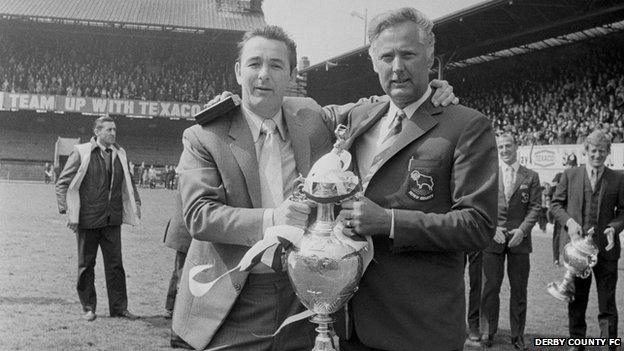
Clough and Taylor joined second division Derby County in 1967
They got promoted in 1969 and later won the Division One title
Clough left the club after a feud with the board of directors
Roy McFarland signed for Clough's Derby when he was still a teenager. Under him, he won a first division title and his first England cap.
"I was there for every single moment of Brian and Peter's six years at Derby," said McFarland.
"They felt it needed two people to run the club and they helped each other.
"When I signed for Derby, one of the first things Clough said to me was that I would be an international player within 12 months.
"This was the first time I had met him and I thought 'what is he talking about?'.
"I had only just moved there from Tranmere Rovers, a fourth division team and thought he was mad.
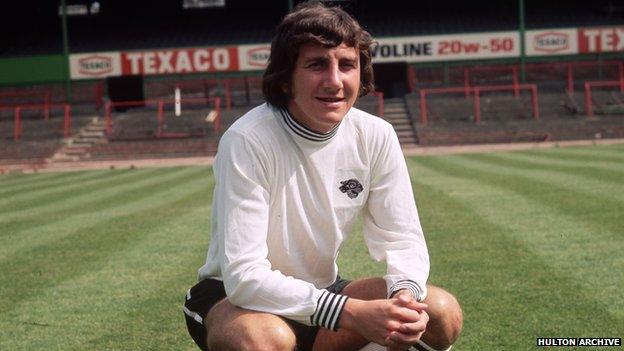
Roy McFarland won his first England cap under Brian Clough
"Him and Peter told me about their vision at Derby. They said 'lots of things are going to change here and we want you to be a part of it'.
"But he was wrong! I got my first under 21 cap for England - 14 months after signing.
"When I look back at it, and what they said, I realise they made it happen.
"There were no international players in his team when I joined but eventually every one of us was an international footballer.
"He was so confident and forthright in saying things. He would forecast things and say we would win the first division, championship and we'd get promoted from the second division.
"Everything they said, all those predictions - they made it happen."

Brighton & Hove Albion (1973-74)
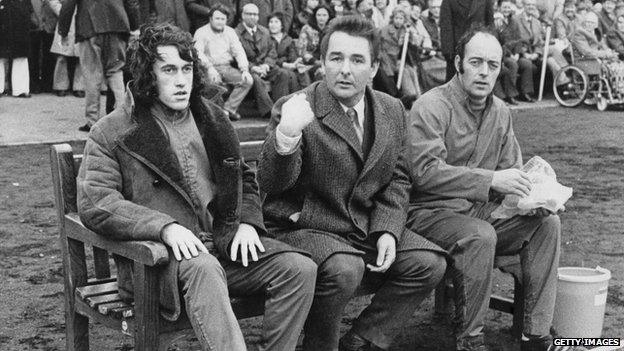
Clough and Taylor moved to Brighton after Derby County
The pair won just 12 out of 32 games
Clough left after half a season to become manager of Leeds
Steve Piper was one of Brighton's youngest players during Clough's brief time on the south coast.
"Brian liked the younger players. We were all in the early stages of our careers and were absolutely frightened to bits of him and did exactly what he wanted us to do," said Piper.
"I was only 20 at the time and played very well for him so it worked for me. We had a decent relationship.
"Once I got sent off in a game against Shrewsbury Town for kicking Alan Durban, who was their player-manager.
"I kicked him up the bum in a bit of a red mist moment and rightly so, I got sent off.
"Alan played under Brian at Derby County so they knew each other pretty well.
"They got together and travelled from Derby to London for the hearing with the league committee.
"The committee there was absolutely terrified of them because I got let off.
"Alan and Brian went out of their way to come and help a young lad they didn't really know and that is the sort of person that Brian was.
"I was very lucky that day."

Leeds United (1974)
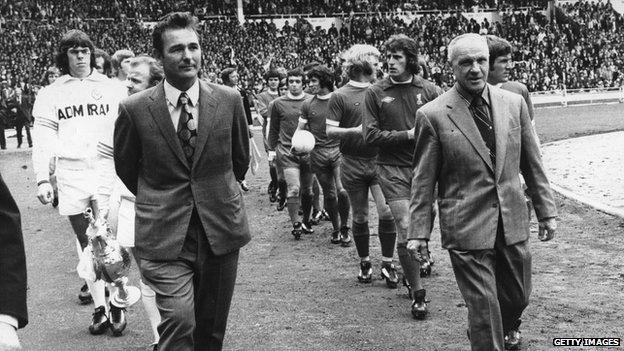
Clough joined Leeds United without Taylor and only lasted 44 days
He was sacked after he won only one of six league games
His contract pay-off was an estimated £98,000 (about £1m by today's standards)
Peter Lorimer played for a hugely successful Leeds United side under Don Revie but he said it was an unhappy time under Clough.
"He told us we'd been successful but we'd not won anything fairly and we should throw all our medals in the bin," said Mr Lorimer.
"That was his opening gambit."
He believed much of Clough's resentment came from his time at Derby County and coming off worse against Revie's Leeds.
"He said I was always dramatic and that I dived for penalties.
"We'd worked so hard and for him to come in to say these things was professional suicide.
"I had nothing against Brian but he never gave himself a chance and without Peter Taylor he was a loose cannon."
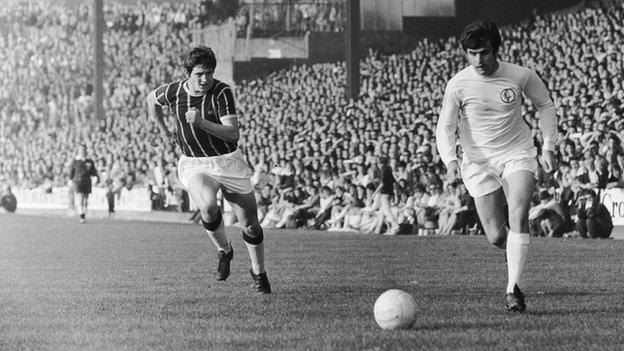
Peter Lorimer (right) said Clough should have been England's manager
Despite what happened at Leeds, Lorimer believes Clough should have been given the England job at the end of the 1970s.
He also represented Leeds United at the memorial service for Clough at Pride Park in 2004.
Stan Anderson, who Clough had become good friends with after their time at Sunderland, was managing QPR when they beat Leeds in August 1974.
It was a result that contributed to Clough's sacking at the club after just six league matches.
"I could see he was rather depressed and I said 'what's the matter, Brian?' and he said 'we've just lost the match'.
"I said 'look Brian, this is a top class club you've come to, you've come a long way since Hartlepool'."
Clough was sacked a few weeks later but Leeds paid out on his contract, setting him up financially for life.
Anderson said: "He said to me 'I've earned more money getting the sack than I've done in the whole of my career'."

Nottingham Forest (1975-82)
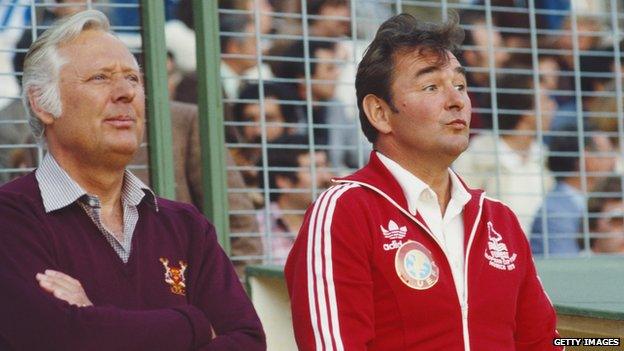
At Forest Clough and Taylor won the Division One title
They also won two European Cups and two League Cups
The pair fell out in 1982 and sadly never made up
Journalist Dave Armitage first met Brian Clough in the mid-1980s when he started working for the Daily Star.
"Cloughie was pretty intimidating, even to the most seasoned campaigner but he was box office," said Mr Armitage.
The journalist, who has compiled three books of short stories about Clough, once bought the manager a present.
He had visited Shrewsbury Flower Show and spotted a variety of sweet pea named after him.
The young reporter bought a couple of packets of seeds and presented them to Clough the next time he interviewed him.
"He said 'are these what I think they are? Are they my sweet peas?'"
Clough explained he had given a nurseryman permission to use his name after he had cultivated a new variety of the flower.
About a year later Clough shouted across to the reporter.
"[Clough] said 'hey, my missus has grown those sweet peas and they're absolutely gorgeous'," said Mr Armitage.
"'She said I ought to invite you over to see them but I said I'm not having sh**house journalists at my house!'"
Mr Armitage said that was Clough's way and eventually he did get an invite to his home.
"[The sweet pea gesture] meant something to him," he said.

Nottingham Forest (1982-93)
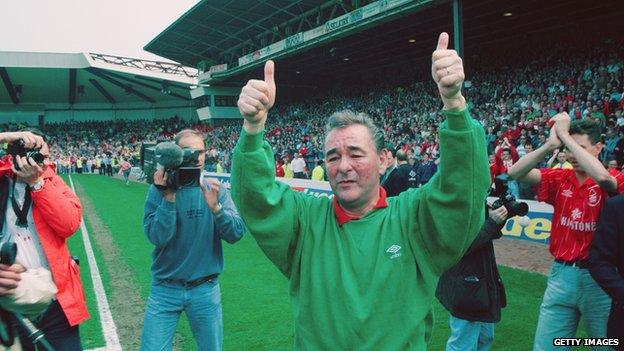
Clough won two further League Cups in 1989 and 1990
His Forest side lost the 1991 FA Cup final to Tottenham Hotspur
Clough left Forest in 1993 after they were relegated
Nottingham Post photographer Trevor Bartlett and reporter Duncan Hamilton became good friends with Brian Clough during his time at Forest.
"It took a while to get to know him. He could be a cantankerous old bugger at times," said Mr Bartlett.
"He never liked managers and directors but he always had time for everybody else.
"Once we were at his house after a trip to Wembley and he took off his suit jacket, checked the pockets and said I could have it.
"It was a really nice thought. It just shows how unbelievable he was.
"I was absolutely chuffed. I put it on and went straight to my local pub to show it off.
"It was big on me and I didn't wear it again. I kept it in the wardrobe for about 10 years."
In 2011 Mr Bartlett donated the jacket to a charity auction at the City Hospital in Nottingham where it raised £1,000.
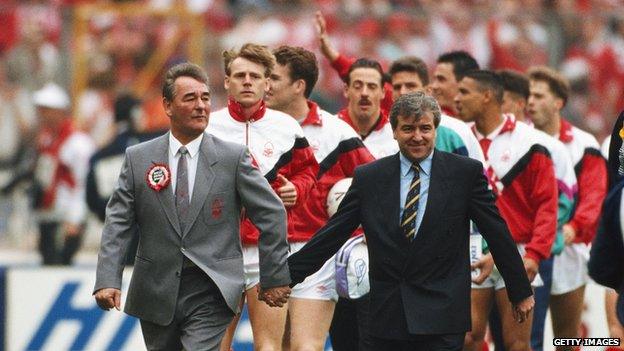
Brian Clough and Terry Venables hold hands before the 1991 FA Cup final
"I used to see him pretty much every day for the best part of 15 years," said Mr Hamilton.
"In '82 at a Forest pre-season tour in the Netherlands, BC saw a tree he liked.
"But they were all travelling on the plane and me and Trevor were on the ferry, so he asked if we could bring the tree back for him.
"We were sweating all the way with it in the back of the car covered in coats, bags and anything we could find.
"I can't even remember what kind of tree it was but BC was exceptionally keen on his garden so he put it in there.
"It's probably still there."
- Published9 March 2013
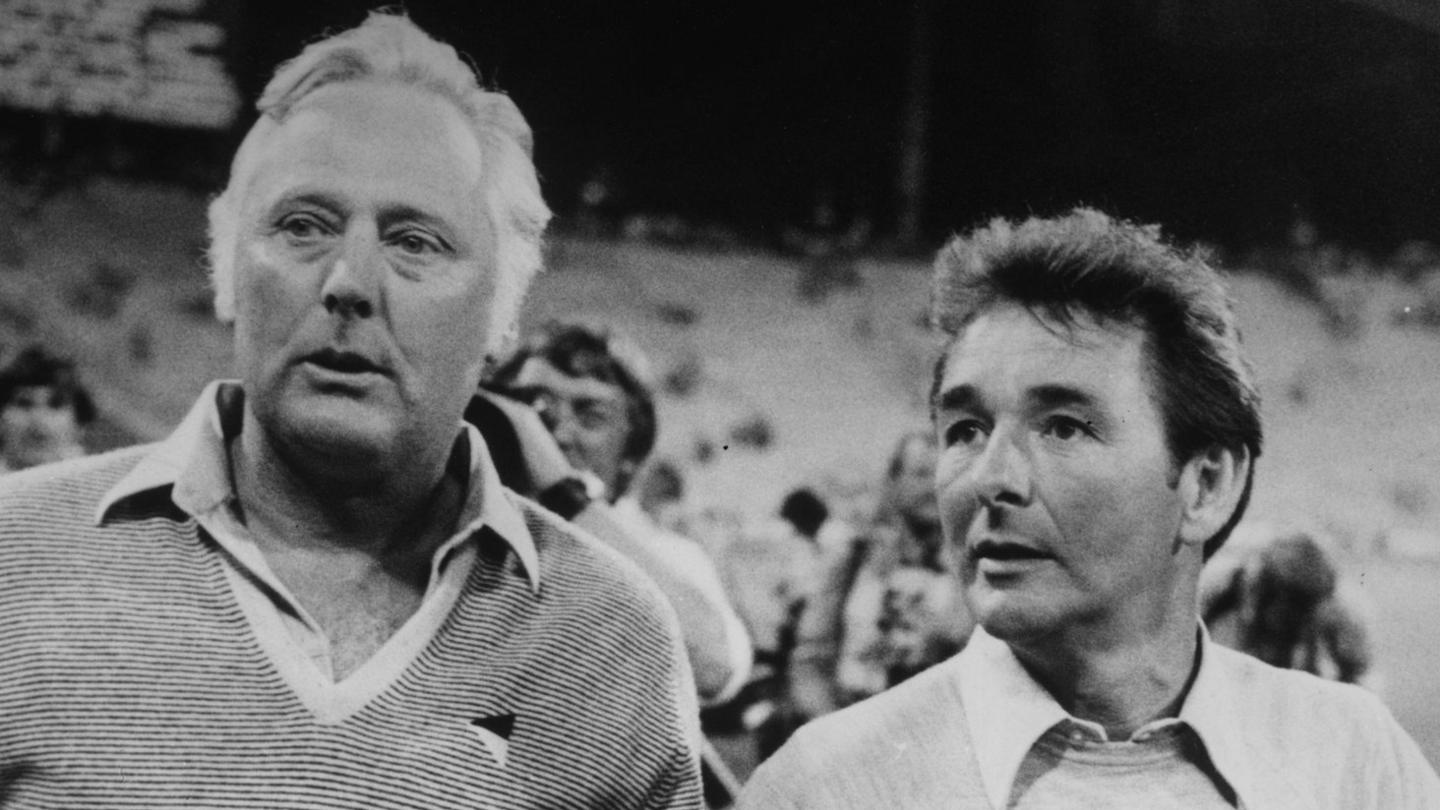
- Published8 September 2012
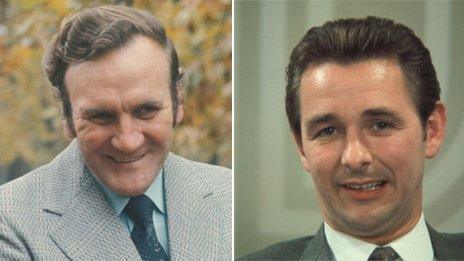
- Published13 October 2011
